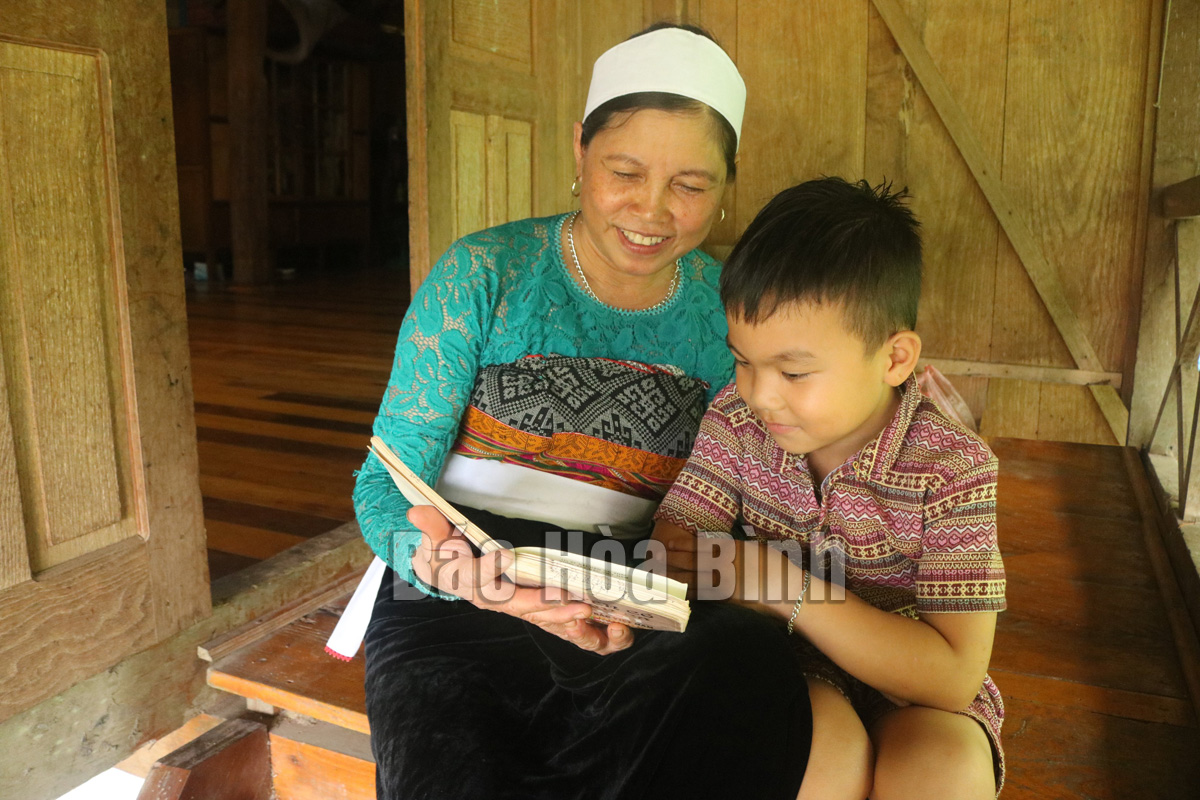
(HBO) – With their strong enthusiasm and passion, Hoa Binh folk singers have worked hard to preserve and promote the value of folk melodies and popularise it in the contemporary life with a hope that the national cultural tradition will live forever.
Artisan Ha Thi Bich in Xam Pa hamlet, Na Phon commune of Mai Chau district,
teaching her grandson to sing folk songs.
Bach Thi Dao, a veteran artisan in Beo hamlet,
Xuan Thuy commune of Kim Boi district, inherited the love for Muong folk
singing from her parents. She has used melodies for communications work.
Meanwhile, Quach Thi Lon from Khanh hamlet of An
Nghia commune represents the young generation of Muong folk singers. She is one
of the youngest Muong folk singers and performers of Lac Son district.
Prompted by the desire to preserve and
popularise the beauty of Muong folk songs to people of other ethnic groups
throughout the country, she and Emeritus Artisan Bui Huy Vong have worked with
each other to develop a YouTube channel called Quach Lon. by now, the channel
has been operating for more than two years, attracting over 14,000 subscribers,
with 1,100 videos of Muong folk songs performed by her that draw a great number
of views.
With more than 50 years of popularising folk
songs to younger generations, artisan Ha Thi Bac is considered a "living
archives" of Thai folk songs as she can sing hundreds of songs as well as
deeply understand the meaning of the lyrics.
In 1998, Bich released an album containing 15
Thai folk songs that she loved most. Operating for more than three years, the
Thai folk song club in Xam Pa hamlet, established by artisan Ha Thi Bich, has
attracted nearly 20 members who are children, teenagers and women who gather
two or three times each month.
Along with regular singing, performing and
exchanging activities and maintaining the club's operations, she has also taught
Thai folk songs to the younger generations with a hope of preventing the risk
of the disappearance of the national cultural identity.
Ha Yen Nhi, a young member of the club for over
one year, said that so far she has learnt to sing 15 Thai folk songs. With the
support of Bich, Nhi’s love and passion for the melodies have been nurtured and
developed, along with her sense of responsibility to maintain and develop Thai
folk songs.
Dao, Lon and Bich are three among the many
artisans who are exerting efforts to maintain the traditional culture and
transfer it to the youth./.
With an increasingly vibrant and widespread emulation movement aimed at building cultured residential areas and cultured families, Yen Thuy District has been making steady progress toward improving both the material and spiritual well-being of its people, while fostering a civilized, prosperous, beautiful, and progressive community.
Once lacking recreational spaces and community facilities, Residential Group 2 in Quynh Lam Ward (Hoa Binh City) has recently received attention for the construction of a new, spacious, and fully equipped cultural house. The project followed the model of state support combined with public contributions in both labor and funding.
The "All people unite to build cultural life" movement, which has been effectively integrated with Kim Boi district’s socio-economic development goals, is fostering a lively spirit of emulation across local residential areas, hamlets, villages, public agencies, and enterprises. In addition, through the initiative, traditional cultural values are being preserved and promoted, while community solidarity and mutual support in poverty reduction and economic development are being strengthened.
A working delegation of the Hoa Binh provincial People’s Committee led by its Permanent Vice Chairman Nguyen Van Toan on June 11 inspected the progress of a project to build the Mo Muong Cultural Heritage Conservation Space linked to tourism services in Hop Phong commune, Cao Phong district.
Born and growing in the heroic land of Muong Dong, Dinh Thi Kieu Dung, a resident in Bo town of Kim Boi district, in her childhood was nurtured by the sweet lullabies of her grandmother and mother. These melodies deeply imprinted on her soul, becoming an inseparable part of her love for her ethnic group's culture. For over 20 years, this love for her hometown has driven Dung to research, collect, and pass down the cultural values of the Muong people to future generations.
In the final days of May, the Ethnic Art Troupe of Hoa Binh Province organized performances to serve the people in remote, mountainous, and particularly disadvantaged areas within the province. These were not just ordinary artistic shows, but they were the meaningful journeys aimed at spreading cultural values, enhancing the spiritual life of the people and contributing to the preservation of ethnic minority cultural identities.



